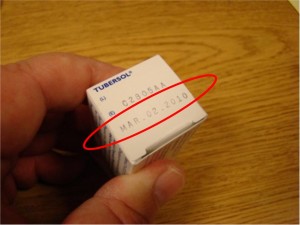Although you will not usually be required to administer medications, you must master the basic rules of administration so that you will be prepared should the occasion arise.
a. Concentrate fully on the task at hand.
b. Make sure that the information on the medication card/slip is identical to the physician’s written order and the label on the patient’s medicine. If not, report it to your supervisor immediately.
[otw_is sidebar=otw-sidebar-1]
c. Never give a medication from an unlabeled container or one on which the label is illegible. The container should be returned to the pharmacy for relabeling in accordance with (IAW) local standing operating procedure (SOP).
d. Whether preparing a dose of medication from a stock supply or obtaining medication from a unit dose package, read the label three times to ensure that the medication and dosage are correct. Read the label:
(1) As the medication is taken from the shelf or medicine cart.
(2) Before the medication is poured or taken from the package or compartment.
(3) As the stock container or empty unit dose package is returned to the shelf or medicine cart.
e. Check your drug dose calculations with your supervisor, nurse, or physician if you are not completely sure of your calculations.
f. Use appropriate measurement equipment to measure quantities as ordered. For example, use a graduated container to measure liquids.
g. Do not alter the dosage ordered for other medication. Check the order with the nurse, physician, or supervisor.
h. Use special care to return medications to their correct location. In some instances, each patient’s medication is kept in a designated place on a shelf or compartment in a central storage area. Never return an unused dose of medicine to a stock bottle. It should be disposed of IAW local SOP.
i. Arrange stock supplies so that preparations for internal use are separated from those used externally.
j. Store medications according to manufacturer’s specifications. For example, vitamin B12 requires refrigeration.
k. Store narcotic and abusable drugs (those dispensed under special legal regulations) and hypodermic supplies in a secure location in accordance with the local SOP.
l. Do not handle tablets or capsules. Shake the required number of tablets/capsules into the container cap and then place the medication into the container that you will take to the patient’s bedside.
m. Check the container label for the expiration date. Dispose of “expired” medications IAW local SOP.

